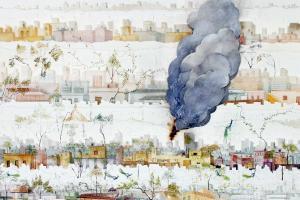Washington-based author Maura Finkelstein talks about her first visit to Mumbai and a fieldsite of the mills that gave her the subject for her first-ever book

Cover art by Digbijayee Khatua shows the textile industry of Central Mumbai
In the fall of 2000, Maura Finkelstein, a then a student at Colorado State University, spent some time in Dharamshala, Himachal Pradesh, conducting research with Indian landlords and Tibetan tenants as part of the School for International Training's (SIT) Tibetan Studies Programme. This visit not just sparked her interest in ethnography, but also in issues related to labourers, their housing rights and migration. From that point on, Finkelstein knew she would return to India to conduct extensive research and write in the field of anthropology. And so she did, six years later to be exact.
ADVERTISEMENT
Originally from Washington DC, Finkelstein always wanted to be a writer, and studying anthropology gave that dream a shape. "Around 2006, I had begun a PhD programme in anthropology at Stanford University. While I knew I wanted to do research in India, I wasn't sure about the location or topic. I had friends in Mumbai, whom I had never visited, so it looked like a good place to start," she shares, adding, "A chance visit to their Lower Parel flat drew me to Mumbai city's mill lands. I was intrigued by the history of the neighbourhood but, almost more so, I was drawn in by the special stratification of Central Mumbai. Passing from the suburbs into town means you literally drive over the mill lands. And so, I was haunted by the question of what life was like in these neighborhoods I could so easily have driven over, had I not been taking the trains and visiting friends."

Maura Finkelstein (below) met the owner of Dhanraj mills in Lower Parel and even visited the site for her research in 2006
Thirteen years of research and interviews later, Finkelstein has written her first book, The Archive of Loss: Lively Ruination in Mill Land Mumbai, which mainly focuses on Dhanraj Mills in Lower Parel. "Finding Dhanraj was serendipitous. As an outsider to Mumbai, I didn't have many connections to the mill lands. After living in the city for a month, I was lucky enough to meet the owner of Dhanraj through a new mutual friend. He was generous and gave me access to the mill compound," she recalls. Of all the other mills, Finkelstein feels Dhanraj's dynamic history makes it special. She explains, "Dhanraj, as a mill, is still operating and I wanted to tell the story of that survival, despite larger city narratives of finality and closure. But mostly I was drawn in by the workers. Even though the workforce has shrunk considerably, the workers I came to know over years of research were generous, welcoming and incredibly helpful. Their pain, illnesses, injuries, and exhaustion narrate industrial decline; and their lives in tenement buildings reveal a disavowed dimension of the modern values expounded by modernity."

Talking about one particular Maharashtrian mill worker, who plays a central role in her book, Finklestein says, "Sushila was the first worker I met at Dhanraj, and she became a friend and mother-like figure to me. She had been born into a chawl in Lower Parel, moved into her husband's family's chawl near Elphinstone Road after her marriage, and ended up in an apartment building in Vikhroli East through the MHADA lottery schemes of the 1970s. She taught me about their struggles for housing in the dense and increasingly unaffordable city.
The mill workers, I came to know, understand themselves as having built the 'modern Mumbai' through their labour in the textile industry and now they can't even find affordable homes in the neighbourhoods."
The book went into production in the summer of 2018. It was launched in the United States earlier this month, through Duke University Press, and is also available on Amazon. "I am hopeful to be back in Mumbai in January of 2020, so perhaps an Indian book launch will happen then," Finklestein, now the assistant professor of anthro-pology at Muhlenberg College in Pennsylvania, says.
Catch up on all the latest Mumbai news, crime news, current affairs, and also a complete guide on Mumbai from food to things to do and events across the city here. Also download the new mid-day Android and iOS apps to get latest updates
 Subscribe today by clicking the link and stay updated with the latest news!" Click here!
Subscribe today by clicking the link and stay updated with the latest news!" Click here!






